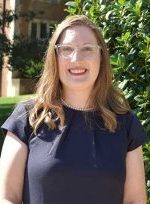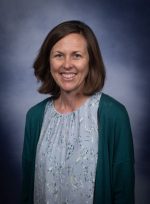The College of Social Work Office of Research Administration is pleased to announce that Courtney Cronley and Kristen Ravi are the recipients of the 2022-2023 Betsey R. Bush Faculty Scholar Award Research Fellowship program.
The competitive application program will provide faculty members one course buyout to work on an external grant application in one of two areas: Behavioral Health, or Children and Families at Risk.
Cronley and Ravi will work closely with Doug Coatsworth, Betsey R. Bush Endowed Professor in Behavioral Health and/or Michael Mason, Betsey R. Bush Endowed Professor in Children and Families at Risk on developing a high-quality grant application. Additional faculty mentors will be brought in as part of the mentoring team as needed.
This award is intended to support development of a grant proposal that describes a high-quality, state-of-the-science research project based on a well-conceived conceptual/theoretical foundation.

For Ravi, the award allows her to focus on Childhood Exposure to Domestic Violence (CEDV) among college students. It has been shown that one in five college students has experienced childhood exposure to domestic violence, which can impact their health and well-being. Exposure to stressful early-life circumstances, such as CEDV, can lead to a cascade of physiological responses that may modify an individual’s health and well-being across the lifespan. Most of the existing research on CEDV centers on its adverse impact on youth behavior and mental and physical health. Few studies have analyzed the effects of CEDV on college students.
Ravi’s interdisciplinary team includes an associate professor from the Department of Child and Family Studies (Megan Haselschwerdt) and an assistant professor from the College of Nursing (Ji Youn Yoo). “Our long-term goal is to advance the field in addressing the later physical and mental health consequences of CEDV to ensure students complete college and enhance their economic well-being,” Ravi explained. “Our overall objective is to demonstrate the acceptability and feasibility of adapting and implementing a mindfulness-based self-compassion (MBSC) intervention with college students with CEDV and collect samples of the students’ saliva, hair, and dry blood spots to measure the intervention’s effectiveness. MBSC interventions that target mindfulness and self-compassion are developmentally appropriate, acceptable, feasible, and efficacious with college students—reducing stress responses, negative self-appraisal, mental health symptoms, and enhancing posttraumatic growth. Given the overlap between CEDV-related outcomes and MBSC-targeted outcomes, we propose that an adapted MBSC intervention is particularly well-suited for college students with CEDV. At the end of the fellowship, the outcome will be submitting an R03 Small Research Grant proposal to the National Institute of Child Health and Human Development (NICHD).”

Cronley is building a highly interdisciplinary team of researchers to design a community-embedded project that they hope will be funded through NSF’s Smart & Connected Communities (S&CC). The team will design a smart, micro-mobility transportation system within the oldest affordable housing neighborhood in Knoxville, Western Heights. The goal is to utilize a human-centered transportation intervention to improve community connection and human wellness. Western Heights is geographically isolated from much of Knox County, and its residents suffer from disproportionately high rates of chronic health conditions and lack of access to quality employment, education, and groceries. In the project, the team will model mobility needs among Western Heights residents through wearable devices, focus groups, and surveys; plan a micro-mobility system using low-speed-electric vehicles (LSVs); hire and train local community-members to drive the LSVs; and design an app to help connect riders with drivers; and measure outcomes such as residents’ health and sense of community connection.
“My first goal is to build an interdisciplinary team,” Cronley explained. “I am a team scientist, and this project is the definition of team science. It is ambitious, broad, and leverages expertise from a range of areas – data science, civil engineering, social and behavioral sciences, and community stakeholders. Why? Because we are trying to intervene to improve human life at the level of physical infrastructure – connecting the physical spaces of our built environment with the human experience. Secondly, I will lead the academic team in co-creating with community stakeholders a robust methodological plan for collecting and modeling mobility data, installing LSVs, and incentivizing community members to use LSVs. Third, we as a team will submit the proposal to NSF and for funding to implement the project.”
